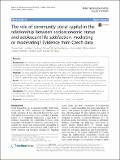The role of community social capital in the relationship between socioeconomic status and adolescent life satisfaction : mediating or moderating? Evidence from Czech data
Abstract
Background. The concept of social capital has been extensively used to explain the relationship between socioeconomic status (SES) and adolescent health and well-being. Much less is known about the specific mechanism through which social capital impacts the relationship. This paper investigates whether an individual’s perception of community social capital moderates or mediates the association between SES and life satisfaction. Methods. This study employs cross-sectional data from the 2009–2010 Czech Health Behaviour in School-Aged Children survey: a WHO Collaborative Cross-National Study (HBSC). A sample of 4425 adolescents from the 5th, 7th and 9th grade (94.5% school response rate, 87% student response) was used to perform multilevel analysis. Results. We found that pupils’ life satisfaction was positively related to both family affluence and perceived wealth. Moreover, we found the cognitive component of social capital to be positively associated with life satisfaction. Additionally, a significant interaction was found, such that the social gradient in life satisfaction was flattened when pupils reported high levels of perceived community social capital. Conclusions. The present findings suggest that community social capital acts as an unequal health resource for adolescents, but could potentially represent opportunities for public health policy to close the gap in socioeconomic disparities.
Citation
Buijs , T , Maes , L , Salonna , F , Van Damme , J , Hublet , A , Kebza , V , Costongs , C , Currie , C & De Clercq , B 2016 , ' The role of community social capital in the relationship between socioeconomic status and adolescent life satisfaction : mediating or moderating? Evidence from Czech data ' , International Journal for Equity in Health , vol. 15 , 203 . https://doi.org/10.1186/s12939-016-0490-x
Publication
International Journal for Equity in Health
Status
Peer reviewed
ISSN
1475-9276Type
Journal article
Description
This work was supported by the Ministry of Education, Youth and Sports (MEYS) under contracts No. LG14042 and No. LG 14043.Collections
Items in the St Andrews Research Repository are protected by copyright, with all rights reserved, unless otherwise indicated.
Related items
Showing items related by title, author, creator and subject.
-
Effect of free medicine distribution on health care costs in Canada over 3 years : a secondary analysis of the CLEAN meds randomized clinical trial
Persaud, Nav; Bedard, Michael; Boozary, Andrew; Glazier, Richard H; Gomes, Tara; Hwang, Stephen W; Jüni, Peter; Law, Michael R; Mamdani, Muhammad; Manns, Braden; Martin, Danielle; Morgan, Steven G; Oh, Paul; Pinto, Andrew D; Shah, Baiju R; Sullivan, Frank; Umali, Norman; Thorpe, Kevin E; Tu, Karen; Wu, Fangyun; Laupacis, Andreas; CLEAN Meds study team (2023-05-26) - Journal articleIMPORTANCE : Few interventions are proven to reduce total health care costs, and addressing cost-related nonadherence has the potential to do so. OBJECTIVE : To determine the effect of eliminating out-of-pocket medication ... -
Pädiatrische versorgungskonzepte in Europa
Weber, Martin W; Backhaus, Sophia; Chukwujama, Obiora; Fenski, Friederike; Henking, Christoph; Schatte, Laura; Aleman-Diaz, Aixa Y (2018-01-19) - Journal articleTo promote children’s health in Europe, the World Health Organization (WHO) developed the European child and adolescent health strategy 2015–2020, which is supported and will be implemented by all Member States (MS). In ... -
Arts-based approaches to promoting health in sub-Saharan Africa : a scoping review
Bunn, Christopher; Kalinga, Chisomo; Mtema, Otiyela; Abdulla, Sharifa; DIllip, Angel; Lwanda, John; Mtenga, Sally M.; Sharp, Jo; Strachan, Zoë; Gray, Cindy M. (2020-05-21) - Journal itemIntroduction Arts-based approaches to health promotion have been used widely across sub-Saharan Africa (SSA), particularly in public health responses to HIV/AIDS. Such approaches draw on deep-rooted historical traditions ...

